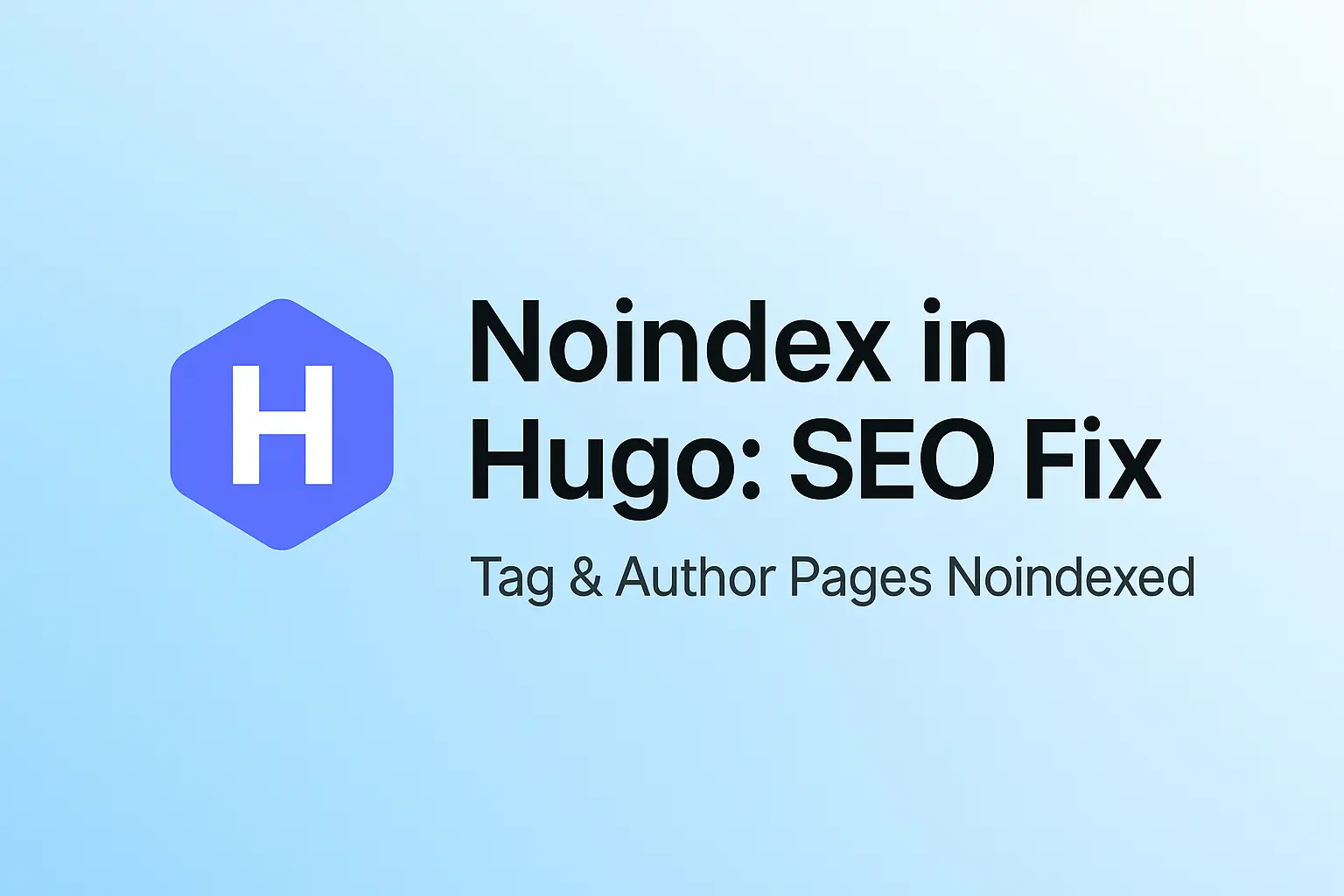Why I Noindexed My Tag and Author Pages in Hugo — A Step-by-Step SEO Fix
Why I Noindexed my tag and author pages in Hugo, how I implemented the fix, and the SEO benefits.
🕒 4 min read
Why I Noindexed My Tag and Author Pages in Hugo — A Step-by-Step SEO Fix
Hey folks,
If you’re running a Hugo-based blog (or really any site with taxonomy pages), this post is for you.
I recently discovered that Google was indexing my tag and author pages — something I never intended. In this post, I’ll explain:
- Why that’s a problem
- How I diagnosed it
- Exactly how I fixed it using Hugo templates
- What benefits I’m already seeing
What I Found in Google Search Console
During a routine check-in with Google Search Console (GSC), I noticed something I hadn’t expected:
URL » Last crawled https://devviews.com/tags/adsense/ » Sep 16, 2025 https://devviews.com/tags/custom-domain/ » Sep 16, 2025 https://devviews.com/authors/ » Already indexed
My /tags/ and /authors/ pages were being crawled — and in some cases, indexed.
That might not sound like a big deal. But if you understand how SEO and crawl budget work, you know this can quickly become a problem.
Why Indexing Tag and Author Pages Is a Bad Idea
Here’s the breakdown:
1. Duplicate Content Issues
Tag and author pages are usually just lists of post excerpts. That means they reuse content that already exists on your blog posts and homepage. Google penalizes sites with duplicate content across URLs because it makes it harder to decide which version to rank.
2. Wasting Crawl Budget
Crawl budget = the number of pages Googlebot will crawl on your site in a given period.
If it wastes time on tag pages, it might not find your new posts or important updates as quickly.
3. Thin Content = Low Value
These pages rarely bring standalone value. People aren’t searching for tags: adsense — they’re searching for “how to set up AdSense on WordPress.” Sending users to a tag page is a poor experience.
4. Diluted Link Equity
Every internal link to a low-value tag page is a missed opportunity to pass link equity (“link juice”) to your important pages — articles, homepage, landing pages.
🔍 Reference: John Mueller (Google) has confirmed that tag pages should often be noindexed, especially for larger sites, to avoid self-competing and cannibalizing search traffic.
The Goal: Noindex Individual Pages, Keep Main Archives
I still wanted:
- ✅
/tags/→ indexable (main tags overview) - ✅
/authors/→ indexable (main authors page) - ✅
/categories/→ indexable
But noindex for individual archive pages:
- ❌
/tags/adsense/ - ❌
/authors/Godfrey-Omoregie/ - ❌
/categories/tutorials/
How I Implemented the Fix in Hugo
I added the following code to my layouts/_default/baseof.html file — right where other meta tags are defined:
{{ $shouldNoindex := false }}
{{ $url := strings.TrimSuffix "/" .RelPermalink }}
{{ if hasPrefix $url "/categories" }}{{ $shouldNoindex = true }}{{ end }}
{{ if hasPrefix $url "/authors" }}{{ $shouldNoindex = true }}{{ end }}
{{ if hasPrefix $url "/tags" }}{{ $shouldNoindex = true }}{{ end }}
{{ if $shouldNoindex }}
<meta name="robots" content="noindex">
{{ else }}
<meta name="robots" content="index, follow">
{{ end }}
Why This Code Works
Trims trailing slashes → ensures /tags and /tags/ are treated the same
Checks URL prefixes → catches any URL beginning with /tags, /authors, or /categories
Sets a variable → clean, extendable logic
One meta tag output → avoids duplicate meta tags
Testing the Implementation
I tested three scenarios:
https://devviews.com/tags/adsense/ → ✅ noindex
https://devviews.com/authors/ → ✅ index
https://devviews.com/articles/my-post/ → ✅ index
👉 I used View Source + Search for “noindex” to confirm results.
Expected SEO Benefits
✅ Cleaner sitemap and index status in GSC
✅ Better crawl efficiency
✅ Reduced duplicate content issues
✅ Improved focus on ranking my actual content
✅ Better user experience (visitors land on real posts, not list pages)
Lesson Learned
If you’re using Hugo, Jekyll, WordPress, or any platform that generates archive pages — check your Google Search Console. You might be surprised what’s being indexed.
A quick noindex fix can save you SEO headaches and help Google better understand your site’s structure.
👉 I’ll follow up in a few weeks with results on whether this improves my crawl rate and organic traffic.
💬 Let me know in the comments if you’ve run into something similar.
Happy coding! 🚀

Comments & Discussion
Join the conversation using your GitHub account. Comments are powered by Utterances.